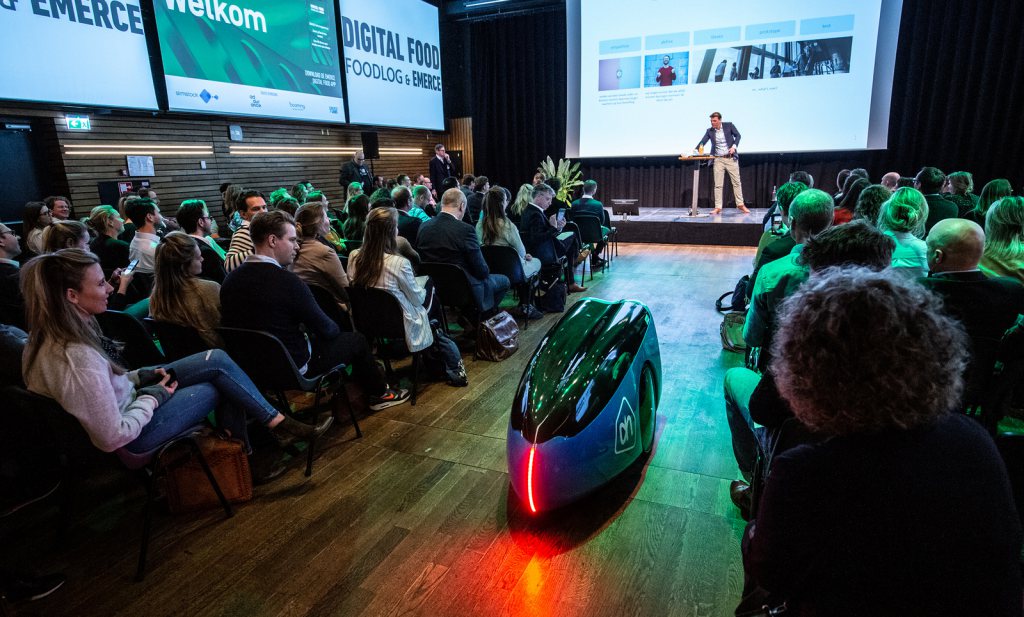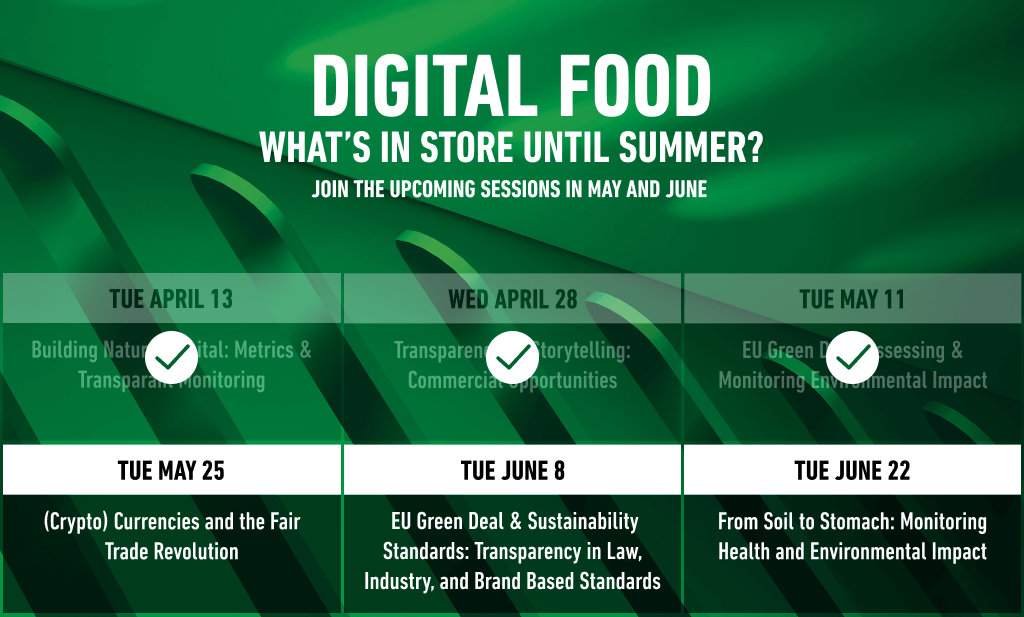Join us on Tuesdays every other week, from 1:30 PM till 2:15 PM (CEST) + 45 more minutes of informality (if you care to stay on) for chats in the Digital Food series. Moderator Tiffany Tsui will talk with her guests about the challenges and opportunities in the brave new food world digitisation makes us enters. Join our conversations for free!
Only one left. It will close the first digital series and set the tone for the rest of the year.
June 22: From Soil to Stomach: Monitoring Health and Environmental Impact
To create a sustainable agriculture the world needs to produce food from healthier and more resistant soils, balanced with a healthy microbiome throughout the chain form farm to fork. In order to improve soil health and a balanced soil microbiome, the users of the end product need to be made aware where to put their money to create a supply of more healthy foods from healthier soils. Transparency and storytelling through digitization can provide the link between soil and stomach.
Want to be sure of a digital seat? Register here.
Upon registration (Free! - the first rounds are on the house) you will receive a link to the ZOOM-chat.
June 22: From Soil to Stomach: Monitoring Health and Environmental Impact
To create a sustainable agriculture the world needs to produce food from healthier and more resistant soils, balanced with a healthy microbiome throughout the chain form farm to fork. In order to improve soil health and a balanced soil microbiome, the users of the end product need to be made aware where to put their money to create a supply of more healthy foods from healthier soils. Transparency and storytelling through digitization can provide the link between soil and stomach.
Want to be sure of a digital seat? Register here.
Upon registration (Free! - the first rounds are on the house) you will receive a link to the ZOOM-chat.
PREVIOUS CHATS IN THIS SERIES
1. Digitisation will disrupt the food system as we know it
In the opening chat of the series, moderator Tiffany Tsui chats with panelists Paul Buisman (Moba, egg packing machines), Kristian Möller (GlobalG.A.P.), Hans de Gier (SyncForce, data integration), and Dick Veerman (Foodlog) to discuss the challenges ahead in the world of digital food.
2. Bye Manpower, Hello Machines and Value
3. The True Code - a free global digital Passport for every Farmer and Facility
Chat 3: in the near future, data will travel with products. Retailers and brands need fast, cheap, and reliable data. There are several platforms (blockchains, data lakes, ERP systems) that already contain supplier and product related-data. These platforms, however, are not interconnected. Data exchange is limited and complicated. Interconnectivity and the easy exchange of data cannot do without a reliable, yet simple identification of every individual company that has a role in the supply chain. This can be done by using a unique electronic passport connected to every individual facility that is an actor in the chain.
4. Blooming Africa - the transfer of practical know how, organising farmers, the AfCFTA free trade area and creating value with transparency
Tiffany Tsui discusses - during the fourth chat - with hands on expert Dutch strawberry grower and advisor Jan Robben, TRUE Code-developer Marjan de Bock-Smit, Victoria Madedor (African Farmers Stories), and Dr Ikechi Agbugba (Rivers State University, Nigeria) how recent border closures on the one hand and new trade opportunities on the other impact agriculture in Africa.
At 1:08:00 min. they were spontaneously joined by Memory Nyakwima Chakwita from Zimbabwe who showed the potential strawberry fields in which she would like to apply all that was discussed. It was a special moment in the informal part of the discussion, showing the potential of this way of connecting people, expertise and ideas.
5. How to unlock Africa’s agricultural potential?
In the fifth chat of the Digital Food series, Tiffany Tsui asked her panel of African experts about challenges to organize trust, capital and infrastructure for African smallholder entrepreneurs. Victoria Madedor (African Farmers Stories), Babatunde Olarewaju (Futux Agri Consult, Lagos, Nigeria), and Dr Ikechi Agbugba (Rivers State University, Nigeria) discussed the overcoming challenges to trade and export of crops. Marjan de Bock-Smit (founder ImpactBuying, former CEO SIM Supply) responds.
The first Digital Food conference in it's pre-covid physical guise in Amsterdam, 2019.

1. Digitisation will disrupt the food system as we know it
In the opening chat of the series, moderator Tiffany Tsui chats with panelists Paul Buisman (Moba, egg packing machines), Kristian Möller (GlobalG.A.P.), Hans de Gier (SyncForce, data integration), and Dick Veerman (Foodlog) to discuss the challenges ahead in the world of digital food.
2. Bye Manpower, Hello Machines and Value
In the absence of a global authority that is aware of the powers unleashed by the digitisation of food, what 'no-body' can guard the interests of the global community?Hans de Gier (SyncForce) explains - during the second chat - the Consumer Goods Forum's Data Ports project. The project's goal is to make the myriad of product standards interoperable by a common basic taxonomy and connecting simple identifiers. The good news: it is fully feasible, as Hans explains in great technical detail.
3. The True Code - a free global digital Passport for every Farmer and Facility
Chat 3: in the near future, data will travel with products. Retailers and brands need fast, cheap, and reliable data. There are several platforms (blockchains, data lakes, ERP systems) that already contain supplier and product related-data. These platforms, however, are not interconnected. Data exchange is limited and complicated. Interconnectivity and the easy exchange of data cannot do without a reliable, yet simple identification of every individual company that has a role in the supply chain. This can be done by using a unique electronic passport connected to every individual facility that is an actor in the chain.
4. Blooming Africa - the transfer of practical know how, organising farmers, the AfCFTA free trade area and creating value with transparency
Tiffany Tsui discusses - during the fourth chat - with hands on expert Dutch strawberry grower and advisor Jan Robben, TRUE Code-developer Marjan de Bock-Smit, Victoria Madedor (African Farmers Stories), and Dr Ikechi Agbugba (Rivers State University, Nigeria) how recent border closures on the one hand and new trade opportunities on the other impact agriculture in Africa.
At 1:08:00 min. they were spontaneously joined by Memory Nyakwima Chakwita from Zimbabwe who showed the potential strawberry fields in which she would like to apply all that was discussed. It was a special moment in the informal part of the discussion, showing the potential of this way of connecting people, expertise and ideas.
5. How to unlock Africa’s agricultural potential?
In the fifth chat of the Digital Food series, Tiffany Tsui asked her panel of African experts about challenges to organize trust, capital and infrastructure for African smallholder entrepreneurs. Victoria Madedor (African Farmers Stories), Babatunde Olarewaju (Futux Agri Consult, Lagos, Nigeria), and Dr Ikechi Agbugba (Rivers State University, Nigeria) discussed the overcoming challenges to trade and export of crops. Marjan de Bock-Smit (founder ImpactBuying, former CEO SIM Supply) responds.




